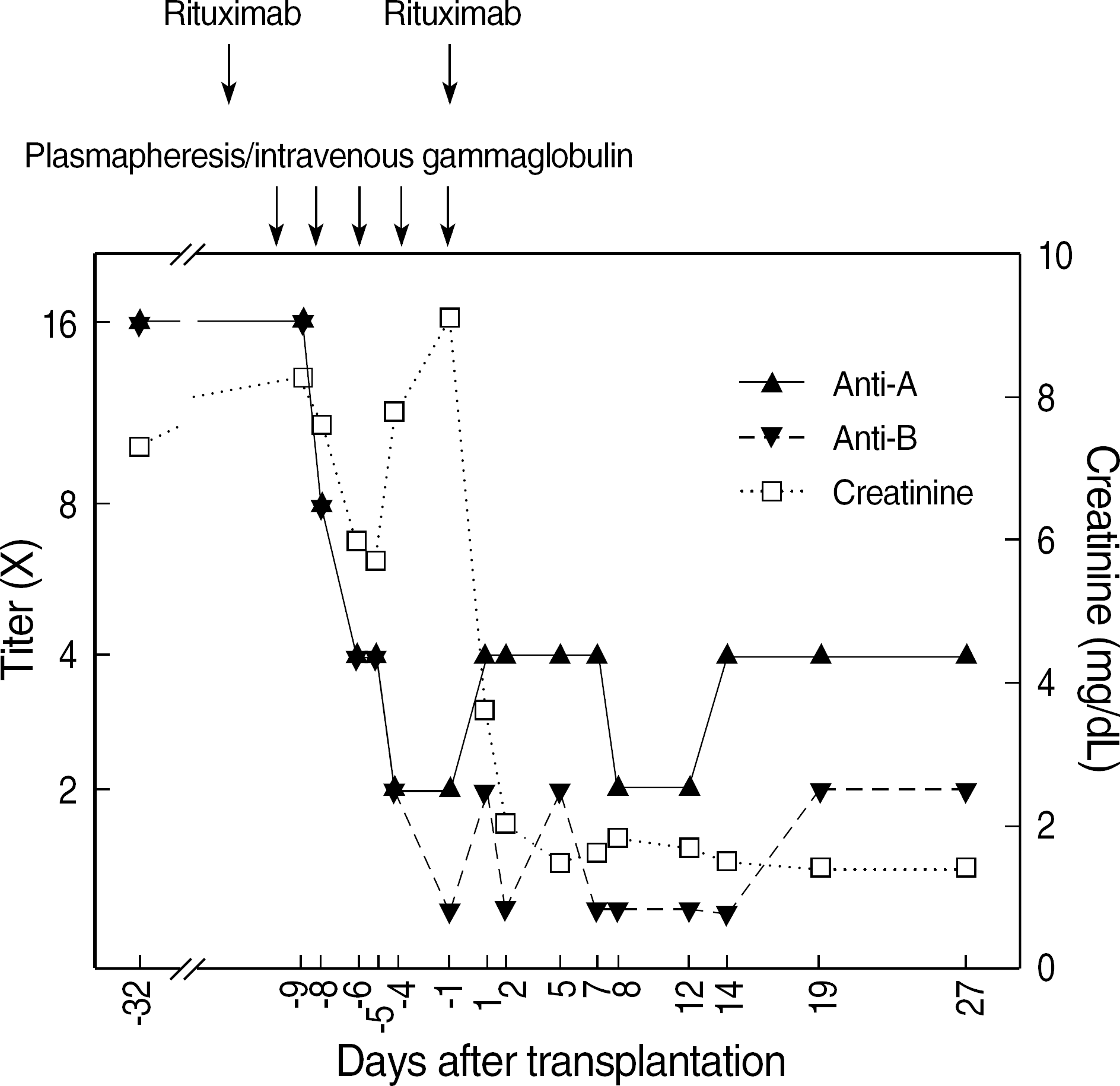Abstract
Due to an extreme shortage of cadaveric kidneys, many centers in Japan successfully performed ABO-incompatible kidney transplantations using plasmapheresis, splenectomy and immunosuppression. Recently, a protocol including anti-CD20 monoclonal antibody (rituximab) and antigen-selective immunoadsorption has been used for ABO-incompatible transplantation in Europe. In Korea, ABO-incompatible kidney transplantation has been rarely performed. We report an experience of successful ABO-incompatible kidney transplantation using plasmapheresis and rituximab. The patient was a 32-yr-old female suffering from chronic renal failure, and her blood type was O, Rh+. The donor was her husband, and his blood type was B, Rh+. A combination therapy including 5 times of plasmapheresis starting from 10 days before transplantation with 2-day interval, intravenous gammaglobulin, rituximab at 2 weeks before transplantation and potent immunosuppression successfully decreased the titers of anti-A and anti-B antibodies to 1:2 and 1:1, respectively. The kidney transplantation was successful without any sign of hyperacute or acute rejection.
REFERENCES
1.Ishida H., Koyama I., Sawada T., Utsumi K., Murakami T., Sannomiya A, et al. Anti-AB titer changes in patients with ABO incompatibility after living related kidney transplantations: survey of 101 cases to determine whether splenectomies are necessary for successful transplantation. Transplantation. 2000. 70:681–5.
2.Takahashi K. Accommodation in ABO-incompatible kidney transplantation: why do kidney grafts survive? Transplant Proc. 2004. 36:193S–6S.

3.Takahashi K., Saito K. Present status of ABO-incompatible kidney transplantation in Japan. Xenotransplantation. 2006. 13:118–22.

4.Takahashi K., Takahara S., Uchida K., Oshima S., Toma H., Sonoda T. Successful results after 3 years' tacrolimus immunosuppression in ABO-incompatible kidney transplantation recipients in Japan. Transplant Proc. 2002. 34:1604–5.

5.Tanabe K., Takahashi K., Sonda K., Tokumoto T., Ishikawa N., Kawai T, et al. Long-term results of ABO-incompatible living kidney transplantation: a single-center experience. Transplantation. 1998. 65:224–8.

6.Tyden G., Donauer J., Wadstrom J., Kumlien G., Wilpert J., Nilsson T, et al. Implementation of a Protocol for ABO-incompatible kidney transplantation—a three-center experience with 60 consecutive transplantations. Transplantation. 2007. 83:1153–5.
7.Tyden G., Kumlien G., Genberg H., Sandberg J., Lundgren T., Fehrman I. ABO incompatible kidney transplantations without splenectomy, using antigen-specific immunoadsorption and rituximab. Am J Transplant. 2005. 5:145–8.

8.Wilpert J., Geyer M., Teschner S., Schaefer T., Pisarski P., Schulz-Huotari C, et al. ABO-incompatible kidney transplantation-proposal of an intensified apheresis strategy for patients with high initial isoagglutinine titers. J Clin Apher. 2007. 22:314–22.

9.Kong JM., Lee DR., Jeong JH., Choi JH., Lee JO., Lee WR, et al. ABO blood group incompatible living donor kidney transplantation without splenectomy. J Korean Soc Transplant. 2009. 23:71–6. (공진민, 이동렬, 정준헌, 최재호, 이정오, 이화림등. 비장적출을하지않은ABO 혈액형 부적합 생체 신장이식 경험. 대한이식학회지 2009;23:71-6.).
10.Roback JD, Combs MR, editors. Technical manual. 16th ed.Bethesda: American Association of Blood Banks;2008.
11.Szczepiorkowski ZM., Bandarenko N., Kim HC., Linenberger ML., Marques MB., Sarode R, et al. Guidelines on the use of therapeutic apheresis in clinical practice: evidence-based approach from the Apheresis Applications Committee of the American Society for Apheresis. J Clin Apher. 2007. 22:106–75.
12.Donauer J., Wilpert J., Geyer M., Schwertfeger E., Kirste G., Drognitz O, et al. ABO-incompatible kidney transplantation using antigenspecific immunoadsorption and rituximab: a single center experience. Xenotransplantation. 2006. 13:108–10.

13.Sonnenday CJ., Ratner LE., Zachary AA., Burdick JF., Samaniego MD., Kraus E, et al. Preemptive therapy with plasmapheresis/intravenous immunoglobulin allows successful live donor renal transplantation in patients with a positive cross-match. Transplant Proc. 2002. 34:1614–6.

14.Kim HR., Lee JN., Kim YH. HLA cross-match negative conversion by therapeutic plasmapheresis in a patient with positive HLA crossmatch. Korean J Lab Med. 2003. 23:439–42. (김혜란, 이정녀, 김영훈. 치료적혈장교환술로HLA 교차시험양성에서음성으로전환된 1예. 대한진단검사의학회지 2003;23:439-42.).
15.Jordan SC. Management of the highly HLA-sensitized patient. A novel role for intravenous gammaglobulin. Am J Transplant. 2002. 2:691–2.




 PDF
PDF ePub
ePub Citation
Citation Print
Print



 XML Download
XML Download